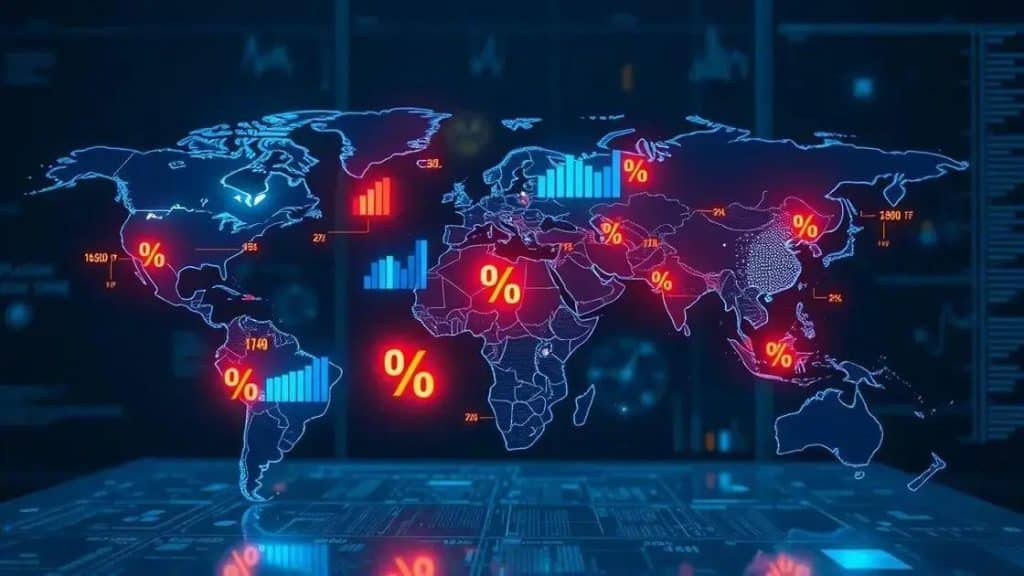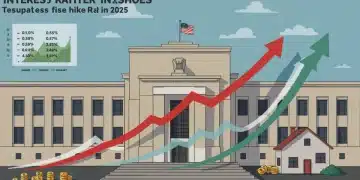Updates on global economic impact of inflation

Sustained inflation significantly impacts consumers by reducing purchasing power, altering spending habits, and causing businesses to adjust prices and investment strategies in response to rising costs.
Updates on global economic impact of inflation reveal how rising prices affect our daily lives. Have you noticed how certain products are costing more? This article explores the dynamics at play.
Understanding the root causes of inflation
Understanding the root causes of inflation is crucial for grasping its effects on the economy. Various factors contribute to rising prices, and these can significantly impact your daily life.
One of the primary drivers of inflation is demand-pull inflation. This occurs when consumer demand exceeds supply. When more people want products than are available, prices tend to rise. Economic growth is often a factor here, as it increases spending capacity.
Cost-Push Inflation
Another key component is cost-push inflation. This happens when the production costs of goods and services increase, pushing prices higher. Rising costs of raw materials or wages can trigger this kind of inflation.
- Global supply chain disruptions can increase costs.
- Natural disasters affecting resource availability can limit supply.
- Increased regulatory costs can impact production.
Additionally, monetary policy plays a significant role in inflation. Central banks, like the Federal Reserve, control the money supply. When they increase the money supply, it can lead to inflation if the economy is already at full capacity. This connection illustrates how important the balance is within the economy.
Inflation Expectations
Lastly, people’s expectations of future inflation can create a cycle. If consumers and businesses expect prices to rise, they may act in ways that contribute to actual inflation, such as demanding higher wages or increasing prices. Understanding these complex triggers helps clarify how inflation impacts not just the economy but our everyday lives.
Current global inflation trends: A closer look
Current global inflation trends show fascinating developments that affect everyone, from consumers to businesses. Understanding these trends can help individuals and organizations prepare for the future.
One clear trend is the rising inflation rates across many countries. In regions like North America and Europe, inflation has surged, driven by various factors. Supply chain disruptions and increased demand for goods following the pandemic have pushed prices higher.
Regional Variations in Inflation
Different regions experience inflation differently due to local economic conditions. For example, emerging markets may face higher inflation rates due to currency fluctuations or unstable supply chains. Conversely, developed nations often have more stable currencies, affecting how inflation impacts pricing.
- Emerging economies might see exponential price increases.
- Developed countries could manage inflation better with monetary policies.
- Local factors, such as natural disasters, can exacerbate trends.
Another important aspect is how consumer behavior adjusts to inflation. People begin to change their spending habits when they anticipate rising prices. For instance, consumers may start buying essential items in bulk, fearing future price hikes. This behavior can further fuel inflation, creating a cycle of rising costs and changing purchasing patterns.
Impact of Monetary Policy
Central banks respond to these trends with monetary policy changes. Increasing interest rates is a common strategy to curb inflation. By making borrowing more expensive, central banks aim to reduce spending and investment, stabilizing prices. However, this approach can also slow down economic growth, leading to careful consideration of how to proceed.
The interconnectedness of global economies means that inflation trends in one region can have ripple effects elsewhere. For example, inflation in the United States can influence trade relationships and currency values around the world. This highlights the importance of monitoring and understanding global inflation trends for everyone involved in economics.
Effects of inflation on consumer behavior

The effects of inflation on consumer behavior are significant and multifaceted. As prices rise, people begin to adjust their spending habits to cope with higher costs.
One immediate response to inflation is a change in purchasing priorities. Consumers may start to focus more on essential items. For instance, they might buy less of non-essential goods, favoring necessities like food and household items instead.
Shifts in Spending Habits
This shift often includes cutting back on luxury items or discretionary spending. With less disposable income available due to increased prices, families find ways to stretch their budgets.
- Shopping for sales and discounts becomes more common.
- People may choose generic brands over name brands to save money.
- Bulk purchasing of goods can occur to avoid higher future prices.
Additionally, inflation can lead to increased anxiety about finances. Consumers may feel uncertain about their financial future, prompting them to save more and spend less. This behavior can impact overall economic growth, as reduced spending may slow down business revenues.
Consumer Confidence
Consumer confidence is closely tied to inflation. When inflation is high, confidence can drop, leading to reduced spending. Conversely, when inflation stabilizes, consumers tend to feel more secure and may increase their spending capacity.
Social media also plays a role in shaping consumer perceptions during inflationary periods. Many people share their experiences and strategies online, influencing others’ behavior. This trend highlights how interconnected our shopping habits have become.
Inflation’s impact on businesses and investments
Inflation has a significant impact on both businesses and investments. As prices rise, companies must adapt to the new economic environment to thrive.
One major effect of inflation is the increase in operating costs. Companies face higher costs for raw materials, labor, and transportation. These rising expenses can lead businesses to pass on costs to consumers in the form of higher prices.
Pricing Strategies
To manage these changes, businesses need to develop effective pricing strategies. They might consider:
- Adjusting prices gradually to avoid shocking consumers.
- Offering promotions or discounts to maintain sales volume.
- Focusing on value-added services to justify price increases.
Additionally, inflation can affect business investments. Companies may hesitate to invest in new projects due to uncertainty about future costs and returns. This caution can slow economic growth and innovation.
Investment Decisions
Investors also react to inflationary pressures. If inflation is expected to rise, they might shift their portfolios toward assets that historically perform well during inflationary periods, such as real estate or commodities. Stocks can be trickier since their performance depends on how well companies manage rising costs.
Moreover, interest rates typically rise in response to inflation, affecting borrowing costs. Higher rates can deter businesses from taking out loans for expansion. Consequently, companies may delay or scale back on investments, impacting long-term growth.
Ultimately, understanding inflation’s impact on both businesses and investments is key for decision-making. Companies and investors must stay informed and adapt to maintain success in a changing economic landscape.
Future implications of sustained inflation
The future implications of sustained inflation are critical to understand for both consumers and policymakers. When inflation remains high for an extended period, it can lead to various economic challenges.
One major concern is the erosion of purchasing power. As prices consistently rise, consumers find that their money buys less over time. This situation can cause people to change their lifestyle choices, often leading to a decrease in overall spending.
Long-term Economic Effects
Sustained inflation can also affect economic growth. Companies may hesitate to invest in new projects when uncertain about future costs. This can result in slower innovation and job creation, negatively impacting the overall economy.
- Businesses may reduce workforce size to cut costs.
- Investment in research and development could decline.
- Consumer confidence may plummet, further decreasing spending.
Moreover, central banks typically respond to high inflation by raising interest rates. While this can help control inflation, it also increases borrowing costs. Homebuyers and small businesses may struggle as loans become more expensive, leading to decreased economic activity.
Social Implications
The social implications of sustained inflation are also significant. Inequality can widen as lower-income households bear the brunt of rising prices, impacting their access to essential goods and services. This can increase public discontent and lead to political instability.
Lastly, inflation expectations can become self-fulfilling. If consumers and businesses anticipate continued high inflation, they may act in ways that exacerbate the problem, such as demanding higher wages or increasing prices proactively.
In conclusion, understanding the impact of inflation is essential for individuals and businesses alike. As we’ve seen, sustained inflation can lead to various challenges, including rising prices, altered consumer behaviors, and significant shifts in economic strategies. By staying informed about these trends, we can better prepare and adapt to the ever-changing landscape of our economy.
FAQ – Questions About the Impact of Inflation
What are the main effects of inflation on consumers?
Inflation reduces purchasing power, making essentials more expensive and forcing consumers to adjust their spending habits.
How does inflation impact businesses?
Businesses may face higher costs and may need to adjust prices or alter their investment strategies in response to inflation.
What are the social implications of sustained inflation?
Sustained inflation can increase inequality, as lower-income households are more affected by rising prices.
How can central banks respond to inflation?
Central banks often raise interest rates to control inflation, which can influence borrowing costs and economic activity.





